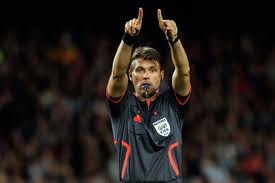By Andrew Warshaw
March 25 – Ever since Russia was awarded the 2018 World Cup over two years ago, racism and how to deal with it has been a constant thorn in the side of organisers. While Qatar, who clinched the 2022 tournament during that momentous simultaneous ballot, has been all about a winter World Cup, how to eliminate abuse has been a top priority for Russian officials.
Roberto Rosetti (pictured), one of the most experienced FIFA referees who retired after the 2110 World Cup and is now head of refereeing at the Russian Football Union, believes that since the introduction of new legislation designed to reduce crowd trouble, significant steps have been taken towards changing the face of Russian football.
He said: “Everything in Russia is changing. Unfortunately we had a couple of fan incidents at Euro 2012 before the Russia-Poland match and also this season at the match between Dynamo Moscow and Zenit when the goalkeeper of Dynamo was struck by a firework and the referee followed the correct procedure to abandon the match.”
“I arrived in Moscow 18 months ago a few months after the episode with Roberto Carlos of Anzhi. It was a difficult moment. But, honestly, in these last 18 months nothing had happened and there has not been any difficult moment. Our police are now working in a very strict manner and are very serious about crowd control inside the stadia.”
In a country where there is constant talk of corruption and with match-fixing now a global phenomenon, Rosetti says referees in Russia are far less susceptible to being targeted than they used be. “I have changed the mentality,” said Rosetti, speaking at the recent Securing Sport 2013 conference in Doha.
“They are very professional and working in a far more serious manner. Also the system of appointments has changed. When I arrived in Russia, referees were appointed one month before matches; that was too long. Now they appointed only four days beforehand. No-one from outside can interfere in this process.”
In terms of crowd trouble, Rosetti says the federation is doing all it can. “We have a new law that, if you want to buy tickets you must show your passport or it is impossible.” One knock-on effect, he said, is that more families were attending games. “When I arrived in Moscow there were no women and children in the stadia but now finally we are starting to see them because football should be a show, like in Germany and England, and we have to give families the possibility to enjoy the matches. I’m sure the 2018 World Cup will be a good promotion for a wonderful country.”
Contact the writer of this story at moc.l1744645448labto1744645448ofdlr1744645448owedi1744645448sni@w1744645448ahsra1744645448w.wer1744645448dna1744645448

